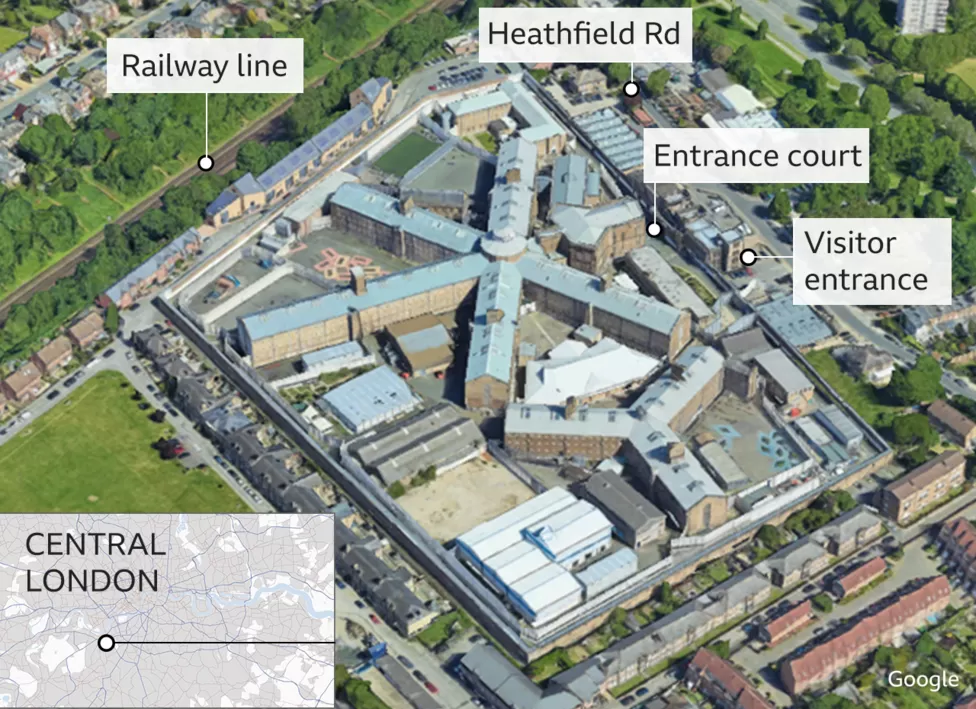A nationwide manhunt has been launched for a former soldier suspected of terror offences who escaped from prison on Wednesday morning.
Daniel Abed Khalife, 21, was awaiting trial at HMP Wandsworth in London after being accused of leaving fake bombs at a military base. It is believed he escaped via a prison kitchen by strapping himself to the underside of a food delivery van.
Extra security checks at airports and ports have led to long delays. The Prison Service is working with the Metropolitan Police to “urgently investigate” how Mr Khalife escaped. A working theory is that Mr Khalife had been in the kitchen when he began his escape from HMP Wandsworth, a category B prison in south-west London, at around 07:50 BST.
He is 6ft 2ins tall and was last seen wearing a prison-issue chef's uniform of a white T-shirt, red and white chequered trousers and brown steel toe cap boots, police said. Police believe Mr Khalife poses a “low risk” to the public but people are being urged not to approach him and to call 999 instead.
Mr Khalife, who joined the Army in 2019, has links to the Kingston area of London and to the North West, but the search has been expanded across the country. As the manhunt stretches into the night, there are no signs that police have made a breakthrough – and the Met's decision to seek the public's help could suggest that any initial leads had gone cold.
Cdr Dominic Murphy, head of the Met's Counter Terrorism Command, confirmed all police forces and UK border points have been put on notice. Airports and ports have been asked to carry out additional security measures, resulting in delays being reported across the UK, including at Heathrow Airport, Manchester Airport, and the Port of Dover.
Disruption at border departure points is expected to ease this evening. Cdr Murphy said counter-terror officers were being deployed across London, where the search is being focussed.
But he said Mr Khalife “could be anywhere in the country at the moment and we are mindful of the risk of him potentially leaving the country”.
The former soldier was on remand awaiting trial in relation to terrorism and Official Secrets Act offences, including preparing an act of terrorism and collecting information useful to an enemy. He was allegedly working for a hostile state. In February, Westminster Magistrates' Court heard he allegedly left fake devices at MOD Stafford, where he was based, “with the intention of inducing in another the belief the item was likely to explode or ignite”.
A previous court appearance heard he “elicited” personal information about soldiers from the Ministry of Defence Joint Personnel Administration System which was “likely to be useful to a person committing or preparing an act of terrorism” in 2021.
Why was ex-soldier not in higher security jail?
Questions are privately being asked in government about whether it was appropriate that Mr Khalife was being held at a lower security prison, rather than a high security facility like Belmarsh in south-east London.
He had previously disappeared from his base on 2 January after the alleged offences, before being arrested “in or near his car” on 26 January after “active efforts to look for him”, a previous court hearing heard. Mr Khalife was denied bail and when he appeared in court via video link in July, he was being held at HMP Wandsworth, a category B facility.
Labour shadow justice secretary Shabana Mahmood said the government needed to “urgently explain how they can't do the basic job of keeping potentially dangerous criminals locked up”. Justice Secretary Alex Chalk has ordered an investigation into the escape and has sought “reassurances about security at the prison”.

He has held two rounds of talks with officials at the Prison and Probation Service, as well as HMP Wandsworth's governor, to ask why Mr Khalife was not being held at a high security prison and whether proper protocols were followed once the alarm was raised.
It is understood that No 10 is being kept updated on the situation.
“An internal investigation is under way and the justice secretary is working to understand from operational colleagues this evening both the categorisation decision and the situation that led to the escape, what protocols were in place and if they were followed”, a Prison Service spokesperson said.
Ian Acheson, a justice expert who has advised the government on counter-terrorism in prisons and was head of security at HMP Wandsworth in the 1990s, called the escape “very serious”. He told BBC News that the category B prison is “not an obvious place for somebody who has been charged with terror offences and is potentially a national security risk”.
Rosena Allin-Khan, the Labour MP for Tooting – the constituency where the prison is situated – said the jail is “chronically understaffed”.
She pointed to figures she obtained showing that around a third of the shifts that needed to be covered on a single day in December 2022 were unfilled. At the time of his escape, Mr Khalife was being held on remand pending a trial due to begin on 13 November at Woolwich Crown Court.
The Ministry of Defence has confirmed he had been kicked out of the armed forces earlier this year, despite the fact he has not been found guilty. A spokesman said: “As a result of being held on remand for these charges, Daniel Khalife was been discharged from the Army on 22 May, 2023.”
Rare escapes
Prison escapes have been rare in recent years, with just five since 2017, and fewer than 20 since 2010. The last infamous escape involving terrorism inmates was the escape from Whitemoor prison in 1994 by IRA prisoners. A January 2022 report by HM Inspectorate of Prisons said a “serious security breach had led to an escape” from HMP Wandsworth in 2019.
The report said the inspectorate had been given “some assurance that action to prevent further escapes had been taken” but said “current local security data evidenced some concerns in the physical aspects of security”.
The prison was placed on lockdown in the hours following Mr Khalife's escape but restrictions have now been lifted.


